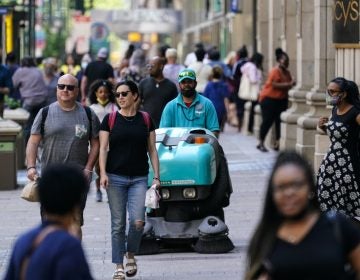The East Germantown Cowboy case gets his day in federal court
Attorneys for William Barnes, a 76-year-old man who remains imprisoned on technical parole violations a year and a half after being cleared of killing a Philadelphia police officer, argued in federal court Tuesday that an assistant district attorney’s vindictive letter-writing campaign convinced the Parole Board to find any reason possible to keep him behind bars.
Barnes, who watched the proceedings via videoconferencing with a walking cane leaning against the prison wall behind him, shot rookie police officer Walter Barclay when he interrrupted an attempted burglary in 1966.
Though he served a lengthy sentence, Barnes was rearrested and charged with murder after Barclay died of a urinary tract infection in 2007.
During a subsequent murder trial at the Criminal Justice Center, Assistant District Attorney Ed Cameron argued there was a direct connection between the shooting and Barclay’s death. The jury disagreed, clearing Barnes in 2010.
Despite the verdict, Barnes remains in prison because, when arrested at work in a Roxborough supermarket, he had a cell phone and car keys on him. In the eyes of the law, they represented parole violations.
Parole Board as jury
Barnes’s legal team, which is led by attorney Sam Silver, argued before U.S. Magistrate Judge Timothy R. Rice that Cameron has since urged the Parole Board to keep Barnes, who was known as the “East Germantown Cowboy” back in the day, behind bars until he dies.
With letters urging them to do just that, board members have used a wide array of inexplicable reasons to deny him parole on several occasions, Silver argued.
“The jury didn’t give it to me, so the Parole Board should. … He wants the Parole Board to undo the jury’s decision,” Silver offered as an interpretation of Cameron’s letters. “This is not a close call. There are no shades of gray here.”
Arguing on behalf of the commonwealth, Barry Kramer said that although Barnes has served four-and-a-half years for those infractions, the Parole Board is not bound by a schedule to release someone after they violate parole.
The back story
During the nearly two-hour hearing, evidence was presented stating that when Barnes was approved for parole in 2004 and 2007, he had accepted responsibility for his actions, gotten a positive recommendation from prison officials and completed the necessary institutional programs.
After Cameron wrote letters to the board in 2008 and beyond – Silver described the message as “I want you to keep this man in prison for life because of the Barclay shooting” – the positive recommendations and a feeling that he had shown remorse for his actions went away.
In their rulings, the Parole Board also noted Barnes was a risk of escape and to the community. He has been denied for parole each year since, most recently in Oct. 2011. In depositions, members of the Parole Board noted that Cameron’s letters “were compelling to us. Very important to us.”
When Rice asked Silver why ordering a new hearing would not suffice, the attorney responded, “Because the record shows that the board hearings are, in effect, a sham. We want him out now. He should be out now.”
The Commonwealth responds
Kramer stated that it is logical for the Parole Board to take prosecutors’s opinions into account when deciding whether an inmate should be released, a stance with which the judge openly agreed.
However, when Kramer noted that the car keys and cell phone with which Barnes was found upon his re-arrest could be “considered implements of escape,” a bemused Rice asked, “Are you saying that with a straight face?” Rice then honed in on the not-guilty verdict.
“A jury acquittal is hugely significant in our society,” he said, noting that Cameron’s letters seemingly “look beyond that. It’s one of the hallmarks of our Constitution. [Beyond the trial], Mr. Cameron has no special insight into Mr. Barnes.”
At the end of the hearing, Rice noted that he would make a “recommendation promptly” on the arguments and offer it to a district judge. Even if he accepts Barnes’s arguments as valid and recommends release, the Commonwealth can appeal it all the way to the U.S. Supreme Court.
“Time is very much not on our side here,” Silver said after the hearing
Barnes’s niece Diane and brother Jimmy said they were hopeful Rice would recommend in his favor and that the Commonwealth would just let it go without appeal.
“Hopefully, his health will hold up,” Jimmy said of his brother, who walks the prison yard regularly to keep in good condition. “I feel a lot better now than I did when I walked into the courthouse.”
WHYY is your source for fact-based, in-depth journalism and information. As a nonprofit organization, we rely on financial support from readers like you. Please give today.




